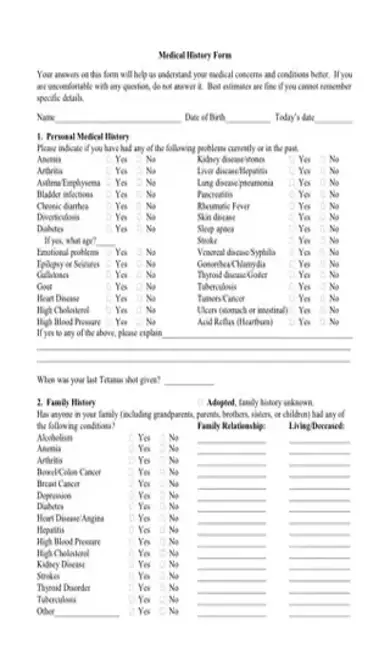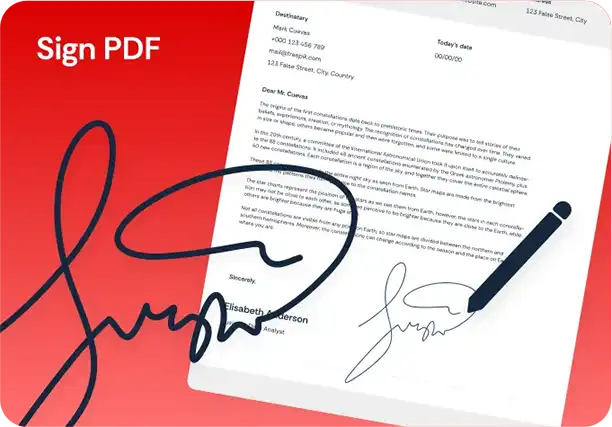Family Medical History PDF Template
Stop searching and find out why people love the ease of creating beautiful and legally compliant Family Medical History PDF with PDFSimpli.

Stop searching and find out why people love the ease of creating beautiful and legally compliant Family Medical History PDF with PDFSimpli.





[toc] When you go to see a new healthcare professional, most of the time, you’ll be asked to fill out a form noting your family’s medical history. This form will cover both mental health issues and physical health issues that appear in your relatives. Family histories are important for a variety of reasons, as they can help doctors know what conditions to look for, what medications to prescribe, and what health risk factors you should be cautious about.
A healthcare professional will use your medical history form to determine whether you have a genetic predisposition to any conditions. When the history is properly collected, it has the following benefits:
A physician can identify whether their patient is at a higher risk for any particular diseases
The healthcare professional can recommend lifestyle choices and treatments to reduce the risk of disease in the patient
The healthcare professional can be on the lookout for early signs of disease
Almost every healthcare professional will ask you for your family medical history. It’s common for one of these forms to be part of your intake packet. However, if you have a particularly long or complex family history, it’s best to fill out an online PDF and bring the completed form with you.
General physicians will use the history form to determine whether they should refer you to any particular specialists. Meanwhile, the specialists will determine whether you have an increased risk for any particular disease.
Even when you go to see a mental health professional, like a psychiatrist, you should provide the physical health history as well as the mental health history. Sometimes, physical health problems can present with mental health symptoms. Certain brain infections can cause psychosis, for example, while an overactive thyroid can cause textbook symptoms of depression.
Mental and physical healthcare are so closely intertwined that it’s vital for the healthcare professionals to have an accurate history. You should be sure to include any addictions and substance use disorders that your family members have. A history of these problems might indicate that you’re genetically predisposed to addiction. This means that a healthcare professional will have to take care in the medications they prescribe you.
Every time you see a new healthcare professional, you should provide them with your family medical history form. The only exception is if the professional is a referral, and your referring doctor’s office has already sent over all of your paperwork including the family history.
You should make sure to have the history be as detailed as possible:
Note the health conditions for first, second, and third-degree relatives
Note the age of all relatives; for deceased relatives, note their age at their time of death
Note the ethnicity of the relatives, as certain genetic diseases are more commonly prevalent in particular ethnic groups
If anyone has a chronic disease, make sure you note it
It’s vital that a family medical history be provided to your healthcare professionals. A healthcare professional’s job is to diagnose and treat illness. Not only will a family history help them know what genetic predispositions you have, but it will also let them know what treatments are safe.
For example, a patient with a family history of cardiovascular disease would usually not be prescribed heavy-duty stimulants for ADHD. These stimulants raise blood pressure, which can cause a major cardiac event in people with cardiovascular disease. If the prescribing doctor knew about the family history, they could prescribe a medication with less catastrophic effects on the blood pressure. Meanwhile, if the patient failed to disclose this information, the treatment could kill them.
You’ll need to capture basic personal information about both you and your partner. Write down your name, date of birth, occupation, and marital status. You should also indicate whether or not you’re adopted.
You should check the boxes for any ethnic backgrounds that your ancestors came from. Then, record all medications that both you and your partner take. This includes vitamins, over-the-counter medicines, and physician-prescribed medicines.
If you or your partner use any harmful substances, you should note the substance, the frequency with which it is used, and any other important information about the use.
You’ll need to put a check mark by any diseases or conditions that you or your partner have. If you have family members with the condition, you’ll also need to check the “Yes” box. For every “Yes” answer, provide an explanation of who has the condition, what their relationship to you is, and how old the person was when the condition manifested.
If your family history includes any medical conditions that haven’t been listed, you should give a written explanation. Also, give an explanation of whether any of your family members has ever had genetic testing done. If you and your partner have any blood relation, such as being first cousins, you should note this on the form as well.[pdf-embedder url=”https://cdn-prod-pdfsimpli-wpcontent.azureedge.net/pdfseoforms/pdf-20180219t134432z-001/pdf/family-medical-history-form.pdf”]
A person’s family history is confidential medical information. It will not be viewed by anyone except the healthcare professional and anyone authorized to see it, such as a nurse or authorized secretary.
Not necessarily. However, if you did have genetic testing done for diseases, and you have concerns about the results, it’s best to show said results to your doctor to get their opinion.
Your healthcare professional will take the history into account when choosing the best, safest treatment options for you. However, a good doctor will listen to your concerns and make adjustments based on any issues you might have with the treatment plan.